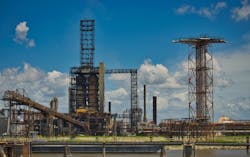In Iran, the Kermanshah Oil Refinery has started to lead environmentally by taking measures to reduce pollution. The oil refinery has become a leading refinery in Iran for “promoting environmentally sound practices in recent years,” according to the Financial Tribune.
The refinery changed furnace burners, constructed a vacuum distillation unit, and also conducted studies on the construction of quality units and production capacity development, according to the Financial Tribune. The new production units will require $300 million to construct and install, said Nasser Ashouri secretary-general of the Oil Refining Industry Cooperative Assn.
The oil refinery also aims to produce high-octane gasoline, low sulfur fuel oil, and gas oil with sulfur below 50 ppm. These goals are part of the refineries' longer-term plan to reduce environmental impacts, Ashouri added, noting they are not the only effective tools at the oil refinery’s disposal.
“The installation of online monitoring systems on the output of industrial wastewater treatment system and furnace chimneys, expansion of green areas around the refinery to more than 21 hectares and using treated industrial wastewater for irrigating the green areas are among the most important measures to decrease pollution at the refinery,” Ashouri said, according to a report from Financial Tribune.
According to the Financial Tribune report, the Kermanshah Oil Refinery is the second oldest oil refining complex in Iran, the first being the Abadan Refinery. The refinery, located in western Iran, produces 100,000 liters of liquid petroleum gas, 750,000 liters of gasoline, 437,000 liters of kerosene and 750,000 liters of fuel oil per day. The daily operational capacity is 25,000 barrels, according to the Tribune.
“Standardizing the output of furnace chimneys, double sealing the roof of tanks to reduce the evaporation of volatile hydrocarbons and establishing the environmental management system of ISO 14001: 2015 have been other measures undertaken to reduce environmental pollutants,” Ashouri said, according to the Tribune.
